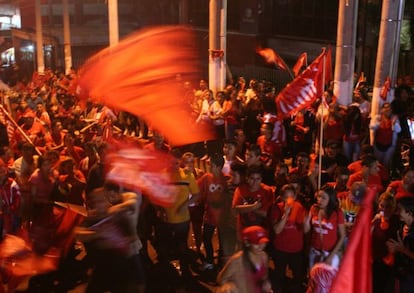FMLN looking for second presidential victory in El Salvador
Former guerrilla commander and conservative Arena candidate will face each other in March runoff

The ruling leftist Farabundo Martí National Liberation Front (FMLN) garnered the most votes in Sunday’s presidential election but not enough to avoid a runoff next month with the conservative Arena party.
With 99 percent of votes counted by the Supreme Electoral Tribunal (TSE) on Monday, FMLN candidate Salvador Sánchez Cerén had received nearly 49 percent support the day before in a hotly contested race that pitted an ultraconservative dentist against the former guerrilla who now serves as the country’s vice president.
The Arena party’s Norman Quijano, 67, received 38.9 percent of the vote and will go on to the second round of voting on March 9, the TSE said. A new center-right party, Unidad, founded by a former president and Arena leader, Elías Antonio Saca, received 11.4 percent of votes.
Voter participation in Sunday elections was registered at 52 percent – eight percentage points lower than at the last elections five years ago.
A former guerrilla movement that was welcomed into the political process following the 1992 peace accords that put an end to the 13-year civil war, the FMLN won its first election in 2009 with former CNN television journalist Mauricio Funes capturing the presidency. Since that peace agreement was signed, Arena had won three consecutive races.
On Sunday, FMLN supporters gathered at the Redondel Masferrer – a major roundabout in the capital San Salvador – to celebrate the results. Dressed in red, the party’s official color, Carlos Peraza, a 44-year-old supporter, said that even though the FMLN did not capture the presidency during the first round he believes the March 9 runoff will only serve to rubber-stamp the win.
“Victory – we will have a rock-solid victory,” he yelled, while hundreds of supporters blew red vuvuzela plastic horns. A group of FMLN supporters showed up later at the Redondel Masferrer carrying a cardboard coffin with Quijano’s portrait pasted on the top.
El Salvador finds itself beset by rampant crime and soaring poverty and inequality. The country’s security problems stem from the ongoing wars between street gangs and the acts of extortion these criminal organizations carry out against businessmen.
Quijano has suggested calling out the military to help in public safety matters
Of El Salvador’s six million residents, 34 percent live below the poverty line and, according to the United Nations, 60 percent of the homes in the country have no running water or electricity.
While there had been reports that violent acts were being planned in the days leading up to the elections, no major incidents were reported at any of the polling stations across the Central American nation.
On Saturday, Quijano, a dentist by profession, said at a political rally that the street gangs “were on the side” of the ruling party, and alleged that security was not guaranteed. “We must trust in God and in our police forces,” he said.
Different international observer groups, including the Organization of American States (OAS), reported that voting took place “peacefully and safely” at polling stations.
One of the most important bastions for the FMLN has been the social programs President Funes has implemented over the past five years, above all the drive to distribute school uniforms and supplies to encourage poor families to push their children to stay in education.
The architect of this program was the current candidate and vice president Salvador Sánchez Cerén, a 69-year-old former teacher and guerrilla commanding general.
For its part, Arena focused on proposing measures to battle the street gangs during the campaign. Quijano has suggested limiting constitutional guarantees as one temporary solution, and calling out the military to help in public safety matters, which would also include transferring “low-risk” inmates from overcrowded Salvadoran prisons to army bases.
The Arena candidate explained that the bases could also be used as boot camps to rehabilitate young people between the ages of 18 and 30 who neither work nor study and are considered high-risk candidates for gang recruitments.
Gang violence by the so-called Mara Salvatrucha (MS-13) gang and its rival, Barrio 18, resulted in putting El Salvador at the top of the lists of the most dangerous countries in the world. During the first three years of the Funes administration, the national annual homicide rate stood at 70 murders per 100,000 residents.
But in 2012, the leaders of the two organizations called a truce from their respected prison cells where they are serving time. In exchange, they called on the Salvadoran government for prison benefits, which they were granted. Since then, the homicide rate – albeit still high – has dropped to 39 murders per 100,000 residents last year.
Tu suscripción se está usando en otro dispositivo
¿Quieres añadir otro usuario a tu suscripción?
Si continúas leyendo en este dispositivo, no se podrá leer en el otro.
FlechaTu suscripción se está usando en otro dispositivo y solo puedes acceder a EL PAÍS desde un dispositivo a la vez.
Si quieres compartir tu cuenta, cambia tu suscripción a la modalidad Premium, así podrás añadir otro usuario. Cada uno accederá con su propia cuenta de email, lo que os permitirá personalizar vuestra experiencia en EL PAÍS.
¿Tienes una suscripción de empresa? Accede aquí para contratar más cuentas.
En el caso de no saber quién está usando tu cuenta, te recomendamos cambiar tu contraseña aquí.
Si decides continuar compartiendo tu cuenta, este mensaje se mostrará en tu dispositivo y en el de la otra persona que está usando tu cuenta de forma indefinida, afectando a tu experiencia de lectura. Puedes consultar aquí los términos y condiciones de la suscripción digital.








































